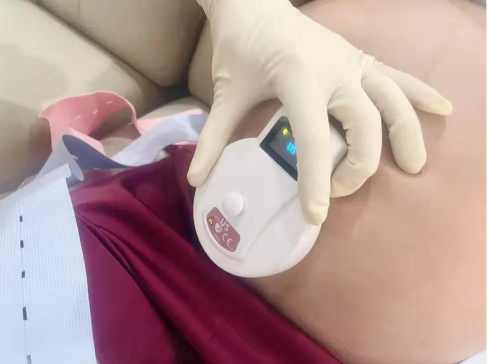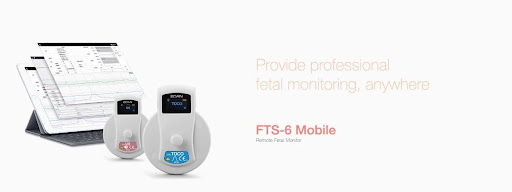To sign up for our daily email newsletter, CLICK HERE
Post-pandemic has seen a surging development of telemedicine, thanks to the rapid response and contactless-ness. However, telemedicine does extend the accessibility of quality healthcare. Following the trend is the development of home or portable healthcare monitoring and tracking instruments that facilitate diagnostic efficiency.
Home fetal monitoring, tools for maintaining the 24/7 connection between families and hospitals, has received great attention. But what is the function of maternal and fetal monitoring, and what is to forge the connection? This article can answer this.

What is Fetal Monitoring? What is the Function of Monitor Fetal Doppler
Fetal monitoring is a critical procedure that assesses the health of a fetus by tracking its heartbeat, which is a key indicator of well-being.
What Can Fetal Heart Rate Tell?
Similar to fetal movement, fetal heart rate (FHR) provides expectant mothers and healthcare providers with essential insights into the health of the unborn baby. The normal fetal heart rate typically ranges from 120 to 160 beats per minute and is regulated by both the sympathetic and parasympathetic nervous systems.
Monitoring these beats helps reveal how the fetus responds to various stimuli, such as maternal contractions, giving a clear view of potential stressors or risks.
The Importance of Proper Fetal Monitoring
Fetal monitoring is an invaluable tool in prenatal care, offering detailed insights into fetal heart rate and movement, which serve as essential indicators of fetal health.
For Safe Pregnancy
Monitoring the fetal heartbeat allows healthcare providers to assess how the baby responds to various intrauterine conditions, such as maternal movement or contractions, providing early detection of potential risks like hypoxia (oxygen deficiency) or distress. Such timely information is crucial for making decisions that may prevent complications, ensuring a safer pregnancy.
For Fetus
Beyond detecting immediate risks, fetal monitoring aids in diagnosing arrhythmias or abnormalities in fetal heart rate, which could point to underlying conditions like congenital heart defects, myocarditis, or rhythm disorders. The detailed patterns observed in fetal heart rate and rhythm allow clinicians to pinpoint causes with greater precision, enabling them to plan early interventions or to take preventive measures as needed.
This diagnostic capability is particularly important in managing high-risk pregnancies, where fetal monitoring serves as a critical means of observing and responding to signs of distress or abnormal development.
For Healthcare Workers
Moreover, fetal monitoring is invaluable for ongoing assessments and the creation of tailored care plans. By closely monitoring heart rate patterns and variations, healthcare professionals gain a clear view of the fetus’ condition and resilience, allowing for personalized intervention strategies.
If signs of oxygen deficiency or fetal distress are detected, physicians can recommend actions like oxygen supplementation or repositioning to enhance fetal well-being, giving both mother and child the best chance for a healthy outcome.

Portable Doppler — How Does Home Fetal Monitoring Work?
Portable Doppler fetal monitors have become an essential link between families and healthcare providers, making fetal monitoring more accessible and personalized than ever.
This device offers remote fetal heart monitoring capabilities that connect directly with hospital monitoring centers. This real-time connection allows doctors to track fetal heart rate trends, assess intrauterine conditions, and promptly detect signs of fetal distress. All require no hospital visit for every check-up.
The benefits of portable Doppler monitors extend far beyond convenience. Studies show that remote monitoring often identifies fetal heart rate abnormalities more frequently than standard in-hospital monitoring, making early detection and intervention possible.
For mothers, this device also alleviates the anxiety, time, and cost associated with frequent hospital visits, as minor concerns can be checked remotely. If any irregularities or signs of distress are detected, healthcare providers can offer prompt guidance or recommend necessary actions without delay.
Furthermore, the continuous and on-demand monitoring these devices provide creates a safer pregnancy experience. Home fetal monitoring systems allow families to conduct daily checks, listen to the baby’s heartbeat, and observe movement patterns.
If the results seem abnormal, the recorded data can be instantly uploaded for professional evaluation, ensuring a rapid response from healthcare teams. This at-home monitoring option has significantly expanded the scope and availability of perinatal care, lowering the rates of perinatal complications.
Home Fetal Monitoring: Who Should Consider it?
High-Risk Pregnancies
Expectant mothers with certain medical conditions benefit significantly from at-home monitoring. These conditions include gestational hypertension, gestational diabetes, immune disorders, or a history of adverse pregnancy outcomes.
Pregnancies with Fetal Concerns
If there are any fetal risk factors, such as twins, reduced fetal growth, low amniotic fluid, decreased fetal movement, or abnormal umbilical cord blood flow, home fetal monitoring can help parents track the baby’s health regularly.
Normal Pregnancies with Specific Needs
For low-risk mothers experiencing issues like reduced fetal movement or slight amniotic fluid abnormalities, home monitoring provides an efficient way to stay connected with healthcare teams. It also benefits those looking to avoid the inconvenience of frequent hospital trips while maintaining consistent fetal monitoring.
Term and Overdue Pregnancies
For mothers approaching or past their due date, labor could start at any time. Home monitoring helps track fetal health in real-time as they prepare for birth, keeping healthcare providers informed of any developments during early labor symptoms.
EDAN FTS-6 Mobile – Safeguard Maternal and Fetal Health
The EDAN FTS-6 Mobile is a compact, portable, and advanced fetal monitoring device designed to ensure maternal and fetal health anywhere—whether at home or during emergency transfers.
With unmatched precision, ease of use, and real-time connectivity, this device empowers patients, families, and healthcare providers with seamless monitoring solutions.
-
Wireless Multi-Chip Waterproof Ultrasound Probe
The FTS-6 captures clear fetal heart signals effortlessly, ensuring accuracy and comfort. It allows for dual-fetus heart monitoring, providing robust support for mothers expecting twins.
-
Real-Time Monitoring and Alerts
With tight in-hospital synchronization, clinicians can view live fetal monitoring data, receive immediate alerts for critical values, and provide prompt guidance, ensuring timely intervention.
-
Patented Interference-Resistant Algorithms
Designed to reduce signal interruptions and enhance data accuracy, the FTS-6 uses state-of-the-art algorithms for reliable heart rate readings, even in challenging conditions.
The system features widely used global scoring methods, making assessments that align with healthcare providers’ preferences for straightforward, effective analysis.

Conclusion
As the world-renowned IVD solutions provider, EDAN’s solutions have been applied in labs, clinics, and hospitals around the globe for improved efficiency and accuracy. Attention to maternal and fetal health has been one of the greatest subjects for EDAN, and thus, they have launched a series of OB&GYN instruments for families, ranging from earlier maternal and fetal monitoring to later maternal health recovery.
Stay tuned with EDAN for more untapped potential in IVD.